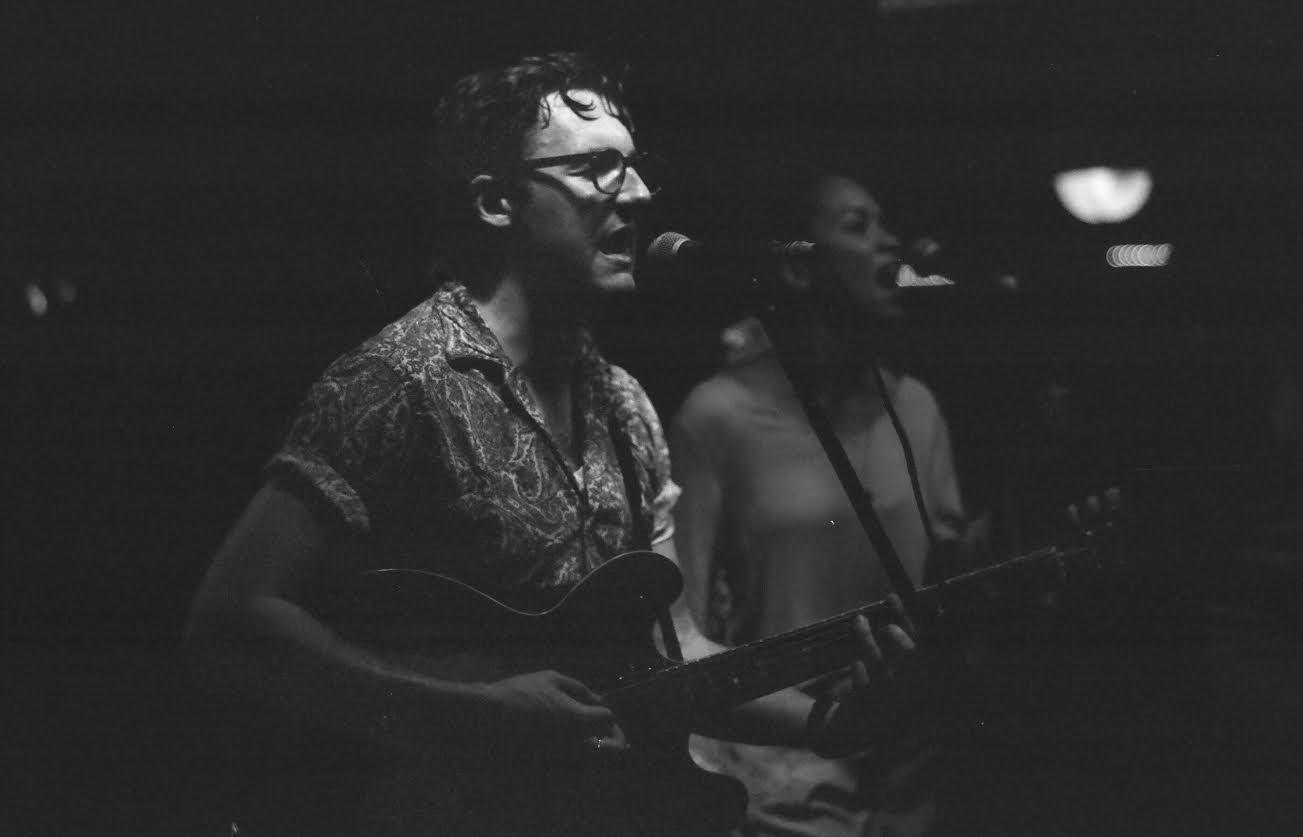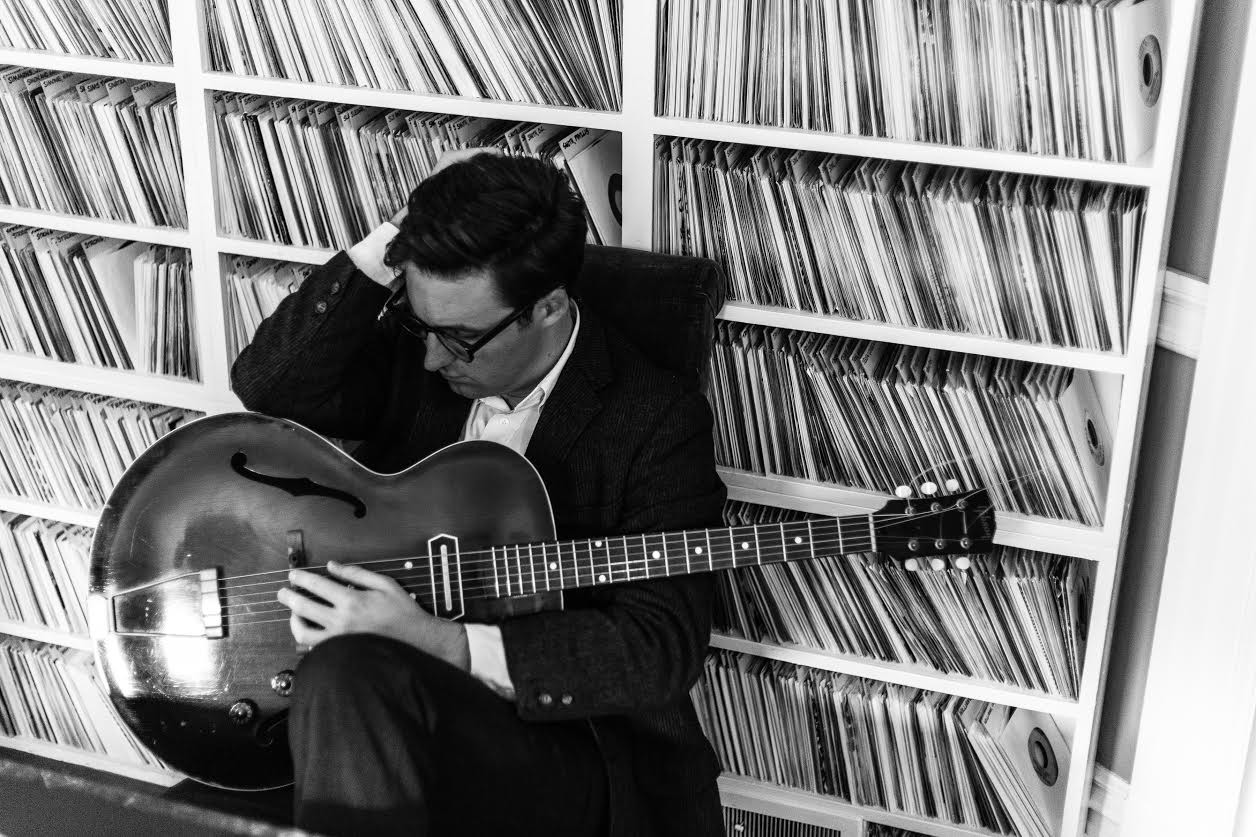 At the start of the new year, Nick Waterhouse wandered into the Costa Mesa record shop I worked at late one evening. He seemed in homeostasis immediately upon entering the threshold that opened to reveal thousands of vinyl records neatly organized in hulking bins.
At the start of the new year, Nick Waterhouse wandered into the Costa Mesa record shop I worked at late one evening. He seemed in homeostasis immediately upon entering the threshold that opened to reveal thousands of vinyl records neatly organized in hulking bins.
Despite just arriving back to Orange County from a quick turnaround drive from San Francisco, he was in high spirits. After a friendly greeting, he promptly spotted the collectible gems on the wall racks and got to hunting. After discovering a handful of obscure Soul and Blues LPs on the wall, he shifted focus to the R&B bin below, continuing his search. “How do you feel about being in the Soul section?” I inquired, baiting him a bit about the placement of his first two albums Time’s All Gone (2012) and Holly (2014) in that genre of the shop. An ambivalent expression cracked on his face, “I don’t know, I think I would rather just be in Rock.”
He disappeared into the vinyl abyss for a bit, then returned to the front desk with a few musical options in hand. With a polite demeanor, he asked to listen on the big system run through PA speakers. Since these items would most likely end up being spun late night during one of his many vocational DJ sets across the country, I happily obliged. Once the needle dropped, the atmosphere inside the store immediately changed from a Costa Mesa shopping center into a San Francisco dance hall spinning hip-shaking, shoulder-shifting, toe-tapping Rhythm and Blues. Other customers felt the energy change, and I could see the effects in their movements as they rhythmically motioned around the layout of the store and perused the bins.
As we listened, Waterhouse transitioned to digging for mid-century 45s, pulling back a drawer in the nearby Jazz section. After some casual flipping, his demeanor lit up with excitement like a kid discovering a piece of 24-carat gold poking through grains of sand at the beach. As the corner of his mouth curled to a grin, he moved towards the desk to share, exposing an old 7-inch single adorned with a private press record label hailing from his very own hometown of Huntington Beach. “I love this. We gotta listen to it,” he said as he motioned to the shop turntable.
 While I repeatedly flipped and flipped his musical choices on the spinning platter, our topics of conversation ranged from his collegiate academics in San Francisco and his stint in England attending university, to nostalgia for the affordable Bay Area in which he used to live, to small talk about travel and his desire to maybe one day make a move to Chicago. He had just completed a three-day back-to-back-to-back set of sold-out performances at the Chicago brick-and-mortar, Schuba’s, over the weekend of New Years, and was clearly still riding the feeling of success from the experience. Waterhouse seemed convinced that if he moved to Chicago, he could travel when the weather was bad, that rent would be affordable in the city, and one day he could own a modest shop with a small rack of records and a few pieces of tailored vintage clothing for sale. I imagined it to have a back room for jamming with fellow musicians. He said he just wanted to live in a neighborhood where he had everything he needed within walking distance.
While I repeatedly flipped and flipped his musical choices on the spinning platter, our topics of conversation ranged from his collegiate academics in San Francisco and his stint in England attending university, to nostalgia for the affordable Bay Area in which he used to live, to small talk about travel and his desire to maybe one day make a move to Chicago. He had just completed a three-day back-to-back-to-back set of sold-out performances at the Chicago brick-and-mortar, Schuba’s, over the weekend of New Years, and was clearly still riding the feeling of success from the experience. Waterhouse seemed convinced that if he moved to Chicago, he could travel when the weather was bad, that rent would be affordable in the city, and one day he could own a modest shop with a small rack of records and a few pieces of tailored vintage clothing for sale. I imagined it to have a back room for jamming with fellow musicians. He said he just wanted to live in a neighborhood where he had everything he needed within walking distance.
As I rang in his purchases for the evening, I asked how his new record was coming along. Waterhouse indicated that it was recorded, with a few final touches still waiting to be finished. Later that week he would be packing up his engineer Mike McHugh, along with his vintage analog equipment, and driving them all into LA to the all-analog studio, Valentine Recording Studios, to start mixing. “It’s a tedious process,” he states, but it is obvious to see that he is eager to finish the marathon that is writing, recording, producing, and pressing his third record using old-school tape.
Nick Waterhouse shows vigor for life, esteem for the carefully and meaningfully crafted, and a passion for undiscovered, forgotten, and underappreciated music. Musically, he prefers tape, vinyl, analog recording equipment, tubes, and vintage microphones, amps, and gear. In accompaniment, he wants the best in every instrument, from his back-up doo-wop vocalists, to saxophonists, bass player, pianist, organist, drummer, percussionist, and wind instrumentalists.
Although conducting such a collection of players may seem daunting to most, Waterhouse has continued this practice diligently since he officially began his crazy ride back in 2010. Since then, he has released two full-length albums, an additional seven 7-inch record singles, and toured the world a few times. On top of that, he started his own label, Pres Records, and has pressed six singles showcasing acts like Allah-Las and Ural Thomas—all while moonlighting as a DJ, working as a record shop employee, and producing and engineering fellow artists. Now with all that under his belt, six years later, Waterhouse returns with his junior full-length effort, Never Twice.
This time around, it seems he has perfected his recording method, and the tone of this newest batch of songs is quite unlike any of his contemporaries’. In order to achieve his given sound, he was fortunate to discover that the recently reopened Valentine Recording Studios in Los Angeles had just the vintage equipment, gear, and space he needed to give his new album the particular studio treatment he’s been longing for since the start of his recording career back at The Distillery in Costa Mesa. At Valentine, the combination of the 1963 Universal Audio board, ‘50s broadcast microphones, and the analog EQs captured on tape facilitates a texture that is gritty, and a rich tone equivalent to listening to a turntable needle dragging over a slightly worn 45rpm vinyl single from the times of Ike Turner, The Orlons, or Booker T. Jones.
With a massive roster of esteemed accompanying musicians, and an appearance by modern soul-man Leon Bridges in the raunchy hit, “Katchi,” Never Twice is truly at an echelon that depicts Waterhouse’s colorful musical maturity. From the start, he comes ripping through with opening track, “It’s Time.” But out the gate, each song is treated with patience and care, especially the drawn out chronicle, “Stanyan Street.” From there, Waterhouse keeps pace, from “The Old Place,” through the jangling “Tracy”, and enduring with fervor until the end track, “L.A. Turnaround.”
In his recent effort, he hasn’t forgotten to pay tribute to his favorite forefathers. The influences of Van Morrison’s songwriting, the cool piano of Bill Evans, the dynamic composing of Mose Allison, and the raw rhythm of Ray Charles are all seeds littered throughout from start to finish of the ten tracks. Themes of perseverance, recession, gentrification, the life of a vagabond, and love mixed with lust reverberating in between every note and lyric give you an idea of what’s to come when the album releases this September 30th on the Innovative Leisure label. The people, places, and situations are all real, even if they maybe aren’t, because through his arrangements, Waterhouse has created a portal to a fascinating underground culture that is vibrant, visceral, and absolutely alive.
Nick Waterhouse performs at Music Tastes Good Festival, Saturday, September 24th in Downtown Long Beach. For tickets, click here. Never Twice available September 30th, to listen, click here.

